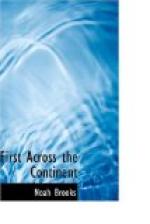Captain Lewis had left a note for Captain Clark at the forks of the Jefferson and Wisdom rivers. Clark’s journal says:—
“We arrived at the forks about four o’clock, but, unluckily, Captain Lewis’s note had been attached to a green pole, which the beaver had cut down, and carried off with the note on it: an accident which deprived us of all information as to the character of the two branches of the river. Observing, therefore, that the northwest fork was most in our direction, we ascended it. We found it extremely rapid, and its waters were scattered in such a manner that for a quarter of a mile we were forced to cut a passage through the willow-brush that leaned over the little channels and united at the top. After going up it for a mile, we encamped on an island which had been overflowed, and was still so wet that we were compelled to make beds of brush to keep ourselves out of the mud. Our provision consisted of two deer which had been killed in the morning.”
It should be borne in mind that this river, up which the party were making their way, was the Wisdom (now Big Hole), and was the northwest fork of the Jefferson, flowing from southeast to northwest; and near the point where it enters the Jefferson, it has a loop toward the northeast; that is to say, it comes from the southwest to a person looking up its mouth.
After going up the Wisdom River, Clark’s party were overtaken by Drewyer, Lewis’s hunter, who had been sent across between the forks to notify Clark that Lewis regarded the other fork—the main Jefferson—as the right course to take. The party, accordingly, turned about and began to descend the stream, in order to ascend the Jefferson. The journal says:—
“On going down, one of the canoes upset and two others filled with water, by which all the baggage was wet and several articles were irrecoverably lost. As one of them swung round in a rapid current, Whitehouse was thrown out of her; while down, the canoe passed over him, and had the water been two inches shallower would have crushed him to pieces; but he escaped with a severe bruise of his leg. In order to repair these misfortunes we hastened (down) to the forks, where we were joined by Captain Lewis. We then passed over to the left (east) side, opposite the entrance of the rapid fork, and camped on a large gravelly bar, near which there was plenty of wood. Here we opened, and exposed to dry, all the articles which had suffered from the water; none of them were completely spoiled except a small keg of powder; the rest of the powder, which was distributed in the different canoes, was quite safe, although it had been under the water for upward of an hour. The air is indeed so pure and dry that any wood-work immediately shrinks, unless it is kept filled with water; but we had placed our powder in small canisters of lead, each containing powder enough for the canister when melted into bullets, and secured with cork and wax, which answered our purpose perfectly. . . .”




